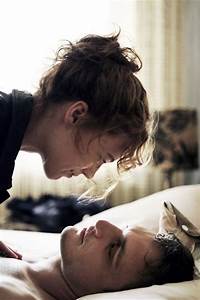At no point in Christian Petzold’s UNDINE do we encounter anything as pedestrian as a character discussing the nature of the supernatural creature at the heart of this exquisitely enigmatic, emotionally intense film. Rather, we are left to ponder just what the nature of our title character is on a more human level. Whether or not she is, or isn’t, a cryptid roaming modern Berlin is almost beside the point.
We meet Undine (Paula Beer) as her husband is leaving her for another woman. The camera focuses on her face, absorbing the stunned grief and denial Beer projects with quiet force in what must be the moment just after Johannes (Jacob Matschenz) has broken the news to her in a café. It rests there, letting the impact of what is happening sink in to us just as it is sinking in to Undine. The first words spoken are Johannes saying that she must have known this was coming, and then a cut to his face, wolfish, wary, and impatient for the ordeal to be over. You can tell, though, that from his perspective, he’s being a mensch about it all, telling her in person and staying with her while she drinks the coffee that he buys her. When she tells him that if he leaves her, she will have to kill him, we can’t blame her. Not really. But there is something about the way she says it, dead serious, and with a distinctly-matter-of-fact affect that is slightly off kilter. She is discussing a deal of which they are both aware, but one that she seems reluctant to enforce with the extreme prejudice in involves. When she warns him to stay there until her break, and then to tell her that he loves her, there is that same odd affect. This is more at stake here than a broken heart, and the rest of the film will tantalize us with whether or not Undine has become unhinged.
Needless to say, Johannes does not wait, and while tears run down Undine’s face, and a disembodied whisper calls her name, her Prince Charming arrives in the person of Christoph (Franz Rogowski). This is not a nobleman on a white horse. Again, far too pedestrian. Instead, he’s a commercial diver who has just taken the tour Undine leads at Berlin’s urban planning office during which he was enchanted by the way she shared the history of Berlin told in the most scholastically bland manner possible. Her silence as he asks to have coffee with her, leaves Johannes to awkwardly back away, only to have fate, or chance, or angry elder deities step in and explode a giant aquarium on them.

Paula Beer, Franz Rogowski
If the expositional narrative skimps, it doesn’t matter. The emotional narrative is comprehensive as we are swept up in the sheer romance of their relationship skipping through time the way memory does. The pain of being left by a cad is more than made up for by Christoph’s unaffected adoration. There are no grand speeches declaimed, nor flowery dialogue. Peer and Rogowski generate a warmth that goes beyond mere lust with tiny cues of body language and the way they look at each other. If she is also a magical creature, it is a magic that is secondary to what these two characters are enjoying.
As in all good mysteries, there are clues about who Undine really is, but ones that are easily dismissed as circumstantial, an impulse reinforced by the way Petzold keeps the scope on the humanity at work. His generates a sense of wonder with a reality-based marvel of a supporting character in the form of a six-foot catfish named Gunther. No, it doesn’t talk, but when Undine become entranced by it, it is as easy to believe that it is strictly because of how grotesquely beautiful Gunther is languidly swimming in his realm. The same can be said of why the diver statuette with which Christophe gifts Undine seems to court destruction.
As a parable about the stasis of trying to move forward without confronting the past, UNDINE is a persuasive précis. Told with elegance and intelligence, it works on several levels at once, all of them darkly poetic.
Your Thoughts?